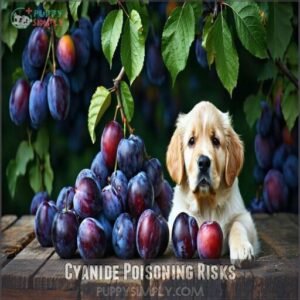This site is supported by our readers. We may earn a commission, at no cost to you, if you purchase through links.
 No, you shouldn’t let your dog eat black plums.
No, you shouldn’t let your dog eat black plums.
While the flesh itself contains beneficial nutrients, black plum pits, stems, and leaves contain cyanide compounds that can be toxic to your furry friend.
The pit also poses a serious choking hazard and can cause intestinal blockages if swallowed.
Even a small amount of the pit can make your pup sick with symptoms like dilated pupils, difficulty breathing, or bright red gums.
If you’re looking for safe fruit options, there are plenty of dog-friendly alternatives that won’t have you racing to the emergency vet in your pajamas at midnight.
Table Of Contents
- Key Takeaways
- Can Dogs Eat Plums
- Are Black Plums Safe
- Plum Pit Hazards
- Safe Plum Feeding Practices
- Alternatives to Black Plums
- Preventing Plum Poisoning
- Frequently Asked Questions (FAQs)
- What happens if my dog eats plums?
- What animals cannot eat plums?
- Why can’t dogs eat peaches or plums?
- Can dogs eat American plums?
- What are the signs of cyanide poisoning in dogs?
- What other fruits are safe for dogs to eat?
- How can I prevent my dog from eating plums?
- Are canned plums safe for dogs to eat?
- Are black plums different from other plums?
- How many black plums can dogs eat?
- Conclusion
Key Takeaways
- Don’t let your dog eat black plum pits, stems, or leaves as they contain toxic cyanide compounds that can cause symptoms like dilated pupils and breathing difficulties.
- You can feed your dog small amounts of plum flesh as an occasional treat, but always completely remove the pit first to prevent choking hazards and intestinal blockages.
- Watch for signs of plum poisoning including excessive drooling, vomiting, unusually red gums, and labored breathing – contact your vet immediately if you notice these symptoms.
- Consider safer alternatives like blueberries, strawberries, seedless watermelon, or peeled bananas that offer similar nutritional benefits without the risks associated with plums.
Can Dogs Eat Plums
You can feed your dog the flesh of plums as an occasional treat, but you’ll need to completely remove the pit first.
The flesh offers beneficial nutrients like vitamins A and C, while the pit contains toxic cyanide and poses a choking hazard.
Nutritional Benefits of Plums
Within the flesh of plums, your dog can find a treasure trove of nutrients. They’re packed with antioxidant support that fights cellular damage and boosts immune function.
Here’s a short, engaging blockquote in the same tone as the paragraph:
Plum flesh delivers powerful antioxidants that shield your pup’s cells while supercharging their immune defenses.
Plums also offer fiber benefits for digestive health, plus vitamins A, C, K, and E that support your pup’s overall wellbeing.
As a hydration source, plums can refresh your dog while naturally stabilizing blood sugar levels after exercise, providing antioxidant support.
Risks of Plum Consumption
While plums can offer nutritional benefits, they come with serious risks for your furry friend.
You should watch out for:
- Plum pits contain cyanide, causing potential plum toxicity in dogs
- Pits pose choking hazards and intestinal blockage risks
- Stems and leaves also contain cyanide exposure dangers
- Pit ingestion symptoms include vomiting and breathing difficulties
Safe alternatives like berries are better options than risking plum poisoning in dogs.
Plums also offer fiber for digestion, but moderation is key.
Are Black Plums Safe
Black plums, like their red and yellow cousins, are safe for your dog to eat—but only the flesh part and always in moderation. When considering plum variety, the color doesn’t change the safety profile.
While black plums offer vitamins A and C plus antioxidants that support your dog’s immune system, they’re high in sugar which can lead to upset stomachs and weight gain. Safe quantities depend on your dog’s size—a small slice is plenty for most pups.
Ripeness matters too; fully ripe plums are easier to digest. Proper preparation methods are vital—always remove the pit and stem before sharing any plum with your furry friend.
Remember that plum pits present hazards due to potential cyanide exposure. If you’re wondering "are plums safe?" remember it’s the pit that poses serious risks, not the flesh. When in doubt about dog plum consumption, check with your vet first.
Plum Pit Hazards
You’ll need to watch out for plum pits as they contain cyanide that can poison your dog and create dangerous choking hazards.
These hard pits can also cause painful intestinal blockages that might require emergency surgery if your curious pup manages to swallow one, leading to a potential emergency.
Cyanide Poisoning Risks
While black plums are generally safe for dogs, the pits contain a hidden danger.
Black plums are safe for dogs when pit-free, but their hidden pits pose serious risks like cyanide poisoning and choking hazards.
When chewed, plum pits release amygdalin, which converts to hydrogen cyanide—a potentially fatal toxin for your furry friend.
- Small dogs face greater risk due to their size, needing less cyanide to reach toxicity levels
- Plum tree parts (stems, leaves, roots) also contain cyanide compounds
- Cyanide concentrations in dogs’ blood can be 4-5 times higher than in serum
Choking and Intestinal Blockage
A hard plum pit lodged in your dog’s throat creates a dangerous choking hazard, especially for smaller breeds with narrower airways.
Beyond choking, swallowed pits can cause intestinal blockage requiring surgical intervention.
Blockage symptoms include vomiting, abdominal pain, and lethargy.
Prevention methods include removing all pits before feeding plums and keeping whole fruits out of your pet’s reach to prevent a potential choking hazard.
Emergency Response
Every second counts if your dog ingests a plum pit. Identify symptoms quickly and take immediate action to prevent complications.
- Watch for excessive drooling, vomiting, or difficulty breathing (signs of cyanide poisoning)
- Look for lethargy, abdominal pain, or constipation (signs of intestinal blockage)
- Contact your vet immediately—don’t wait for symptoms to worsen
- Have poison control’s number (ASPCA: 888-426-4435) saved in your phone
- Bring any remaining plum parts for identification
Plum pits present a significant choking hazard for dogs, which can lead to intestinal blockage and other serious issues.
Safe Plum Feeding Practices
You’ll need to remove the pit and stem completely before offering any plum to your furry friend, as these parts contain harmful toxins that could make your dog sick.
When feeding plums to your dog, always cut the flesh into small, bite-sized pieces and offer them only as an occasional treat, making up no more than 5-10% of their daily food intake, to ensure a safe and healthy treat.
Removing Pits and Stems
Before giving plums to your dog, always remove the pits and stems completely. These parts contain cyanide and pose serious choking hazards.
Use pit removal tools or simply cut around the pit with a knife, ensuring no fragments remain. A plum pitter makes this task easier.
Proper disposal methods are essential—place pits and stems in covered trash bins where your curious pup can’t access them. Safe cutting techniques prevent accidental ingestion and keep your furry friend protected.
Monitoring for Toxicity
Regarding plum toxicity in dogs, vigilance is key.
Watch for early symptoms like excessive drooling, vomiting, or tremors after your dog consumes plums.
Signs of cyanide poisoning include labored breathing, unusually red gums, and dilated pupils.
Don’t wait if you notice these plum poisoning indicators – contact your vet immediately.
Even small amounts of cyanide from pits can pose serious risks, making post-ingestion care critical.
Consulting a Veterinarian
Before introducing plums into your dog’s diet, always consult your veterinarian. They’ll provide personalized advice based on your pet’s breed considerations, existing health conditions, and potential allergy concerns.
Your vet might recommend allergy testing if you’re unsure about specific concerns regarding plums or other dietary changes.
This professional guidance guarantees your dog’s unique health needs are addressed, keeping your furry friend safe and healthy.
Alternatives to Black Plums
You’ll find many safer and more nutritious alternatives to black plums that your dog will love just as much.
From antioxidant-rich berries to potassium-packed bananas, these dog-friendly fruits offer similar benefits without the risks associated with plum pits.
Berries and Other Fruits
Berry bonanzas offer safer, more nutritious alternatives to black plums for your furry friend.
Blueberries, strawberries, and raspberries pack powerful antioxidants while staying low in calories.
You can also safely offer peeled bananas, seedless watermelon, and cored apples in proper portion sizes.
These fruits dogs can eat provide essential vitamins without the risks associated with plums.
Always wash thoroughly and cut into bite-sized pieces for easy snacking, ensuring a nutritious experience for your pet.
Avoiding Toxic Fruits
While berries offer safe options for your furry friend, knowing which fruits to avoid is equally important for your dog’s safety.
Certain fruits pose serious health risks to dogs:
- Grapes and raisins can cause kidney failure even in small amounts
- Cherries contain pits with cyanide (similar to plum pits)
- Avocados contain persin, toxic to many animals
- Citrus fruits in large quantities can upset stomachs
- Persimmons with seeds can cause intestinal blockage
Research each fruit before sharing with your pup to ensure their health and well-being, and always prioritize their dog’s safety.
Consulting a Veterinarian for Recommendations
While knowing which fruits to avoid helps, your vet should be your go-to expert for dog-friendly foods.
Every pup has unique dietary needs based on breed specifics, health conditions, and potential allergy concerns.
Schedule a veterinary consultation to discuss portion control and safe alternatives to plums.
Your vet can provide personalized pet dietary guidelines that account for your dog’s size, age, and canine dietary needs.
Preventing Plum Poisoning
You’ll need to keep plums and their pits out of your curious dog’s reach by storing fruit in secure containers and properly disposing of pits in covered trash bins.
Don’t underestimate your furry friend’s determination to snatch forbidden treats, as even the most well-behaved dogs can turn into skilled counter-surfers when tempted by sweet fruits, and remember to always keep them away from forbidden treats.
Storing Plums Safely
In your home, keep plums away from curious paws by storing them in the fridge or sealed containers.
Don’t leave these fruits on countertops where your dog might reach them. Child safety locks on pantry doors can provide extra protection for persistent pups.
For maximum safety, consider using specialized food containers designed for fruit storage.
Always wash plums thoroughly before your own consumption to remove residues that could harm your dog’s health, and ensure you handle them in a way that prevents accidents.
Securing Garbage Bins
Garbage bins often serve as treasure troves for curious canines.
You’ll need to secure bins containing plum pits with locking mechanisms or childproof locks to prevent dog poisoning. Place outdoor storage containers in areas your pet can’t access.
Consider investing in dog proof solutions to further secure your bins. Proper bin placement away from fences or jumping platforms adds an extra layer of pet safety, reducing the risk of plum toxicity substantially.
Supervising Dogs Around Plums
While training your dog to avoid plum trees during walks, never leave them unsupervised in areas with fallen fruit.
You’ll need to be especially vigilant during playtime in gardens with plum trees, as curious pups often investigate everything with their mouths.
Responsible ownership means maintaining constant supervision when garden hazards like plums are present, preventing potential plum poisoning or choking hazards that could lead to emergency vet visits.
Plums can be beneficial, providing fiber for digestion if prepared safely.
Frequently Asked Questions (FAQs)
What happens if my dog eats plums?
Nearly 70% of pet emergencies involve food-related incidents.
If your dog eats plum flesh, they’re usually fine. However, if they consume the pit, it’s toxic and can cause choking or intestinal blockage.
Call your vet immediately.
What animals cannot eat plums?
Cats, horses, and small pets like rabbits shouldn’t eat plums.
The pits contain cyanide that’s toxic to most animals, while the high sugar content can upset digestion in herbivores.
Keep plums away from your feathered friends too.
Why can’t dogs eat peaches or plums?
An ounce of prevention is worth a pound of cure.
You shouldn’t feed your dog peaches or plums because their pits contain cyanide, which is toxic, and they’re also choking hazards that can cause intestinal blockages.
Can dogs eat American plums?
Yes, dogs can eat American plums but only the flesh.
Always remove the pit as it contains cyanide, which is toxic.
Serve in small amounts as an occasional treat to avoid digestive issues.
What are the signs of cyanide poisoning in dogs?
Watch for dilated pupils, bright red gums, difficulty breathing, rapid heart rate, seizures, weakness, and vomiting.
These symptoms demand immediate veterinary attention, as cyanide poisoning can quickly become life-threatening for your dog.
What other fruits are safe for dogs to eat?
You can safely feed your dog apples (without seeds), bananas, blueberries, watermelon (seedless), strawberries, pineapple, and mango (pit removed). Always serve in moderation and cut into small, manageable pieces.
How can I prevent my dog from eating plums?
After finding my puppy with a fallen plum, I learned fast.
Store plums in closed containers, keep fruit bowls out of reach, secure trash bins, and fence off plum trees in your yard.
Are canned plums safe for dogs to eat?
Canned plums aren’t recommended for dogs.
They typically contain added sugars and preservatives that can upset your dog’s stomach.
It’s safer to offer small amounts of fresh plum flesh as an occasional treat instead.
Are black plums different from other plums?
Like shadows in a garden, black plums aren’t fundamentally different from other plum varieties.
They’re simply a darker variation with the same safety considerations – edible flesh but toxic pits that you’ll need to remove.
How many black plums can dogs eat?
Dogs can enjoy 1-2 small slices of black plums occasionally as treats.
You’ll want to remove the pit completely and monitor your dog for any digestive issues afterward.
Never exceed 10% of their daily caloric intake.
Conclusion
Keeping your furry friend safe is a million times more important than sharing your snack.
While the question "can dogs eat black plums" has a straightforward answer—no—it’s vital to remember why.
The toxic pits, choking hazards, and potential for intestinal blockage make black plums a dangerous choice for dogs.
Instead, reach for dog-friendly fruits like blueberries or apple slices (minus seeds).
Your pup will enjoy these safer treats just as much, without the midnight emergency vet visits.
- https://fdc.nal.usda.gov/fdc-app.html
- https://www.nutritionvalue.org/Plums%2C_raw_nutritional_value.html
- https://www.aspca.org/pet-care/animal-poison-control/toxic-and-non-toxic-plants/plum
- https://www.merckvetmanual.com/digestive-system/diseases-of-the-stomach-and-intestines-in-small-animals/gastrointestinal-obstruction-in-small-animals
- https://www.petpoisonhelpline.com/
















